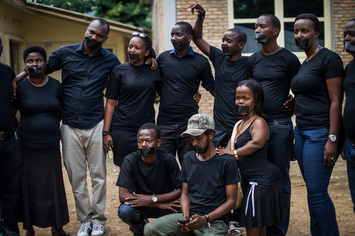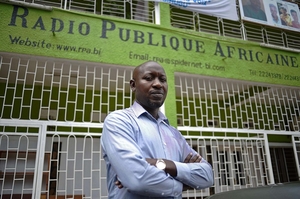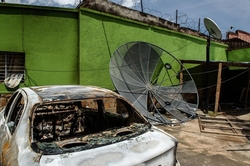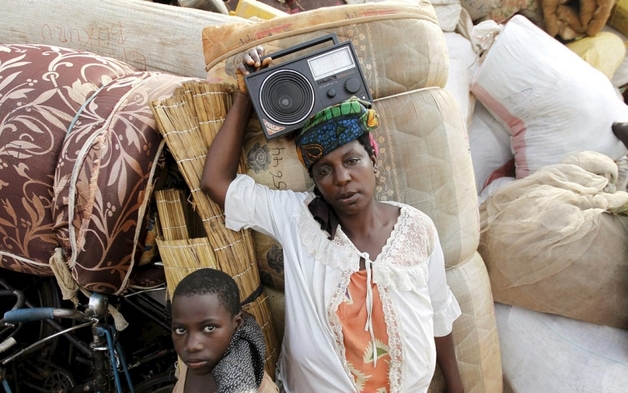 Women's Day, Water Day, Humanitarian Day, Peace Day... Internationally adopted commemorative days are usually celebrated but not World Press Freedom Day in the countries where press freedom is most at risk. On this day last year, three dozen journalists dressed in black met at the offices of ones of the few independent newspapers in the Burundian capital, Bujumbura, to do what journalists on World Press Freedom Day do best: namely, to write about themselves. Their need was greater than most: the near-complete obliteration of the media in Burundi was underway. The government had already closed down the country’s most popular radio station, RPA. They had also cut off the regional broadcasts of the other independent radio stations. Electricity being scarce and illiteracy widespread in Burundi, radio is the primary means of information dissemination. This clamp-down on press freedom had plunged millions into deafness.  Bob Rugurika, the director of RPA, had spent January in jail for broadcasting reports that implicated the state in the high-profile murder of three Italian nuns. Nevertheless, he found reason to be optimistic when I interviewed him on 3 May 2015: "It’s been a long, step-by-step journey to unite the country, but after 15 years, we suddenly realised that we’d done it. […] Tutsis and Hutus are fighting together against the third term of the president,” he said. The election was looming, and the president wanted a third term in office, in contravention of the constitution and the terms of the peace deal that ended the 13-year civil war. In the weeks that followed Press Freedom Day, things quickly went from bad to worse. A failed coup on May 13th resulted in the government punishing the independent radio stations for broadcasting it. Journalists became traitors. A rocket smashed into RPA. Grenades and gunfire hit Bonesha FM and Renaissance TV. Friends of mine today are still missing valuable evidence because bullets destroyed their hard drives or screens and they can't rescue the data. On 19 May, six days after the coup, a well-known RPA journalist called Euloge Niyonzima left the country in the backseat of my car. He was shaken. Armed men –– state-sponsored assassins, he believed –– had forced entry into his house while his wife and two young daughters slept. (Niyonzima had not been there at the time, knowing already that it was unsafe to sleep in his own home.) Sick at the thought that he was endangering his young family, he left the country by the first available means. He arrived in Tanzania speechless and shaking. He had been so focused on getting out of the country alive that he had not thought about what he would do when he got there. His story, which I wrote for Al Jazeera America in May last year, has not grown old. It continues to be the story of many in Burundi today, who flee in the face of a very real threat to their lives. Six months later, state security forces executed Christophe Nkezabahizi, a respected journalist in his sixties, his wife and two teenage children, by shooting them all at close range in the head and chest. The assassination horrified his colleagues, but did not stop them from their quest to shine light on what was happening in their country.  For Burundians, Facebook and WhatsApp have become macabre death blogs, in which the latest killings –– eviscerations, beheadings, executions –– appear in all their gory detail. Mobile phone pictures of death as it really is; not the stylised, sanitised death we see in the western media. And the killing of journalists goes on. Just last week, my Facebook feed told me of a bright, funny, beautiful young intern at Radio Isanganiro, Bélinda, who was punched with bullets and shredded by shrapnel from a grenade while relaxing over a beer in a small bar in Bujumbura one evening. What I mention here is just a tiny proportion of the attacks against Burundian journalists in the last year. But it does not stop them. Those journalists who can, keep on working. (And it is of course very different for the local reporters than it is for us – when it gets tough for us foreigners, we can call our embassies, pack our bags and leave.) So, to those journalists working and living in Burundi today, to those who believe in the power of the press to bear witness, or to those who simply can’t abide by lies, today is your day – chapeau. Photos thanks to Phil Moore, Thomas Mukoya / Reuters, Carl de Souza/AFP, Jennifer Huxta/AFP
0 Comments
Leave a Reply. |

 RSS Feed
RSS Feed
